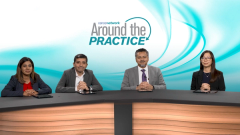
Opinion|Videos|February 14, 2025
Applying Evidence to Clinical Practice: 63-Year-Old Patient With R/R MM Post Dara-VRd Induction Scenario
Panelists discuss how managing a 68-year-old patient with newly diagnosed multiple myeloma (MM) with suboptimal response to Dara-VRd (daratumumab plus bortezomib, lenalidomide, and dexamethasone) requires careful consideration of timing for CAR T referral, product selection, and bridging strategies, while balancing the patient’s preference against standard transplant options in the context of non-high-risk disease.
Advertisement
Episodes in this series

Video content above is prompted by the following:
- A 68-year-old man with R-ISS II IgG Kappa MM without any high-risk cytogenetic abnormalities diagnosed in June 2024; bone marrow showing 70% abnormal plasma cells, M-spike 4.8, no bone lesions, anemia present. Patient started on Dara-VRd induction by local oncologist, restaging BMBx after 4 cycles showing 60% abnormal plasma cells. Referred to Memorial Sloan Kettering for consideration of salvage treatment +/– autologous stem cell transplantation (ASCT) for refractory disease. After a long discussion with bone marrow transplant team, patient and daughter declined ASCT and requested CAR T referral.
- What is the right time for CAR T referral?
- High-risk considerations
- Bridging
- CAR T product selection
- Referral process/transition back to community
Newsletter
Stay up to date on recent advances in the multidisciplinary approach to cancer.
Advertisement
Latest CME
Advertisement
Advertisement
Trending on CancerNetwork
1
Modifiable Risk Factors Suggest Potential for Improving Cancer Prevention
2
2026 Tandem Meetings: What’s the Latest Research in Multiple Myeloma?
3
Dato-DXd Receives Priority Review in Unresectable/Metastatic TNBC
4
Barriers to CAR T-Cell Referral and Center Access in Multiple Myeloma
5





































